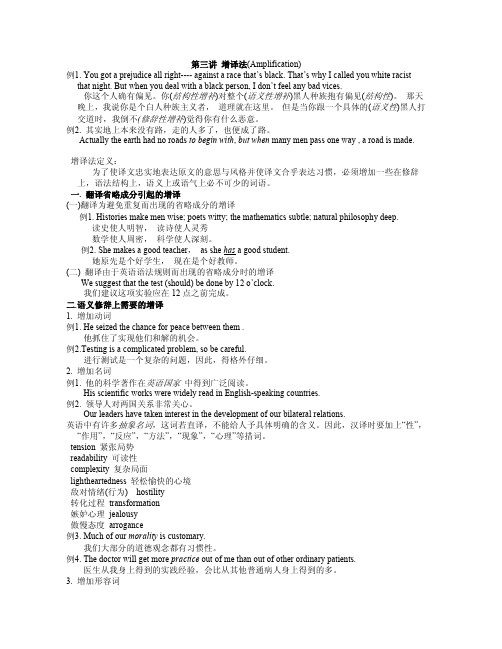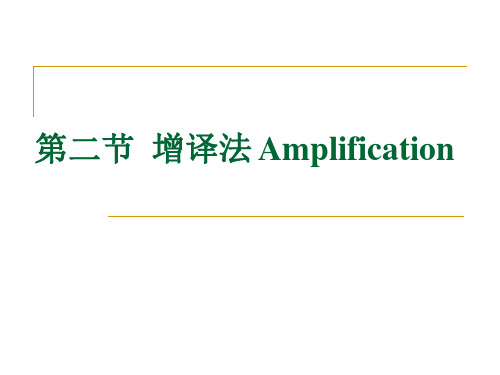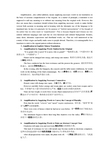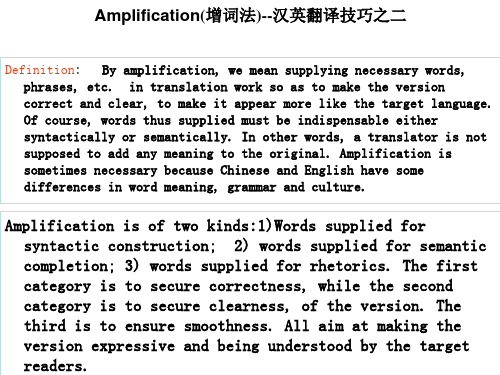新编英汉翻译教程7 Amplification
增译法Amplification

第三讲增译法(Amplification)例1.You got a prejudice all right----against a race that’s black.That’s why I called you white racist that night.But when you deal with a black person,I don’t feel any bad vices.你这个人确有偏见。
你(结构性增补)对整个(语义性增补)黑人种族抱有偏见(结构性)。
那天晚上,我说你是个白人种族主义者,道理就在这里。
但是当你跟一个具体的(语义性)黑人打交道时,我倒不(修辞性增补)觉得你有什么恶意。
例2.其实地上本来没有路,走的人多了,也便成了路。
Actually the earth had no roads to begin with,but when many men pass one way,a road is made.增译法定义:为了使译文忠实地表达原文的意思与风格并使译文合乎表达习惯,必须增加一些在修辞上,语法结构上,语义上或语气上必不可少的词语。
一.翻译省略成分引起的增译(一)翻译为避免重复而出现的省略成分的增译例1.Histories make men wise;poets witty;the mathematics subtle;natural philosophy deep.读史使人明智,读诗使人灵秀数学使人周密,科学使人深刻。
例2.She makes a good teacher,as she has a good student.她原先是个好学生,现在是个好教师。
(二)翻译由于英语语法规则而出现的省略成分时的增译We suggest that the test(should)be done by12o’clock.我们建议这项实验应在12点之前完成。
二.语义修辞上需要的增译1.增加动词例1.He seized the chance for peace between them.他抓住了实现他们和解的机会。
英汉互译增译法及省译法

Translating Techniques增译法&省译法u增词法就是在翻译时根据意义上或修辞上或句法上的需要增加原文中虽无其词但有其义的一些词。
u增词绝不是无中生有,不是随意增加原文没有的意义。
u Some metals are easy to machine; others are not.一些金属容易加工,而另一些却。
south.u你也许感到好奇,为什么磁铁的极指向南北呢?u增译的原则:不可添意,适可而止u You may wonder why the magnet's poles point north an1.Reading makes a full man; conference a ready man; and writingan exact man.2.We don’t regret, we never have and never will.3.After the basketball, he still has an important conference.1. Reading makes a full man; conference a ready man; and writing an exact man.读书充实,讨论机智,笔记(写作)使人准确。
2. We don’t regret, we never have and never will.我们不会后悔,我们从来没有,我们将来也不会。
3. After the basketball, he still has an important conference.看完篮球比赛之后,他还有一个重要会议。
1.With what enthusiasm the Chinese people are building socialism!2.The crowds melted away.3.As he sat down and began talking, words poured out.4.She lingered long over his letter.With what enthusiasm the Chinese people are building socialism! 中国人民正以热情建设社会主义啊!The crowds melted away.人群散开了。
Unit 7增词法 Amplification

4. 增加名词
A. 不及物动词后增加名词
由于英语中有及物动词和不及物动词之分,
有时宾语隐藏在动词后面,翻译成汉语时 需要把宾语补充出来。 To do some shopping 买东西 To do some washing 洗衣服 He began to see things and to understand. 他开了眼界,懂了一些名堂。
4). His arrogance made everyone dislike him. 他的傲慢态度使谁也不喜欢他。 5). After all preparations were made, the planes were flown across the U.S. to San Francisco. 一切准备工作就绪以后, 飞机就飞越美国去了旧金山。 由例4 、5可以看出, 某些动词或形容词派生来的 抽象名词,翻译时可以根据上下文在其后面增添适当 的名词,使译文更符合规范。 又如:
He
ate and drank, for he was exhausted. 由于疲倦了,他吃了些东西,喝了点酒。
The invading troops looted and raped
wherever they went. 入侵士兵到处抢劫财物,奸污妇女。
B. 在形容词前增加名词 1) “It is really nice and cheap. You will regret for not buying it later.” 由例可见,均在形容词 这真是物美价廉,你不买会后悔的。 前增加名词,从而使译
2. 增加形容词
1) With what enthusiasm the Chinese people
Amplification 增补(C)

4). Supplying Words Necessary in Structure or Collocation of the Translated Version(补充译文
结构或搭配所需要的词)
(A). Adding Nouns before Adjectives (1). The new digital camera is easy to operate, versatile, compact and has a pleasant modern design. 这种新款数码相机操作简便,功能齐全,结构 紧凑,造型美观。
3). Supplying Necessary Connectives (增补表示逻
辑关系的词语)
(1). We didn’t admit it (escape) was impossible. To do so would have been to surrender one of few hopes. 我们认为越狱不是不可能。如果认为不可能, 那就等于把我们仅存的一点希望也放弃了。 (3). At the time of Kennedy’s assassination, people thought that a second term would have led either to greatness or to . 肯尼迪遇刺时,人们认为,假如他再任一届总统 的话,大概不是功高盖世,就是祸国殃民。
他今天上午的确很忙:要上两节课,参加一个会议,还要 接受一个采访。 2). Adding Words Omitted Syntactically in the Source Text (增补原文中的省略部分) A). 比较句
(1). The footmen were as ready to serve her as they were (ready to serve) their own mistress. 仆人们愿意服侍她,就像他们愿意服侍他们的女主人一 样。
英文翻译技巧之Amplification(增益法)

Amplification , also called addition, means supplying necessary words in our translation on the basis of accurate comprehension of the original. As a matter of principle, a translator is not supposed to add any meaning to or subtract any meaning from the original work. However, this does not mean that a translator should refrain from supplying necessary words to make his/her version both accurate in meaning and in keeping with the idiomatic use of the language to be translated into. In fact, it is precisely for the purpose of “faithful representation” of the thought of the author that we often resort to “amplification”. This is because English and Chinese are two entirely different languages and each has its own historical and cultural background. Besides, many ideas, idiomatic expressions and shorthand words, etc. That are well understood in the country of their origin can hardly make sense to people abroad. Therefore, it is unimaginable for a translator to stick to the orginal pattern without alteration.Ⅰ. Amplification in English-Chinese Translation1.Amplification by Supplying Words Omitted in the Original"if so grand, why so poor? If so poor, why so grand?" “既然那么阔,干吗要叫穷?既然那么穷,干吗摆阔气?”·Matter can be changed into energy, and energy into matter. 物质可以转化为能,能也可以转化为物质。
amplifica(增词法

汉语里有时不用表明事物范畴的概括性词语,翻译成英语 时却往往需要增补进去,不然译文含义就不清楚,或者语 法结构上有缺陷,或行文不畅。 A)结婚大办酒席,实在可以免去了。 The practice of giving lavish feasts at weddings can well be dispensed with。 B)黄金白银,坚甲利兵,并非构成大国的要素。 Gold and silver, a strong army and powerful weapons---these are not the elements that constitute a great nation.
Amplification is of two kinds:1)Words supplied for syntactic construction; 2) words supplied for semantic completion; 3) words supplied for rhetorics. The first category is to secure correctness, while the second category is to secure clearness, of the version. The third is to ensure smoothness. All aim at making the version expressive and being understood by the target readers.
(三)修辞性增补
修辞性增补大都是处于行文上的考虑,所增加的词多为不改变原意的语气词,强 调性副词,或其他修辞上需要的词汇,以使意义明确,或使人物性格鲜明。 1)旧社会一个内阁总理可以去当县长,为什么我们一个部长倒不能去当县长? If a Prime Minister in the old society could serve as county magistrate, why on earth can’t our ministers do the likewise? 2) 那绝不是很慢,而是相当快的。 compare: A) The progress is not very slow but quite quick. B) Far from being slow, they are quite fast. C) Far from being slow, they are actually rather fast. 3)他哪一年参加过革命? When, if ever, did he take part in the revolution? 4) 大家庆幸着自己逃脱不了死于小虫的厄运。 Everybody rejoiced at their good fortune in escaping a near disaster caused by such minute and seemingly insignificant ants. 练习: 万一你想取消这次旅行,请至少提前一个月书面通知我们。 If by any chance you want to cancel the trip, please give us at least one month’s written notice.
Amplification 增词法功能用法详细介绍
• He doubtlessly expected hugs, tablefuls of food, tears, laughter, and conversation followed by more conversation, then hugs and more hugs all over again, without end. • 毫无疑问,他以为会有热烈的拥抱,满 桌的食物,激动的泪水, 欢乐的笑声, 一段接一段的谈话,一次又一次的拥抱, 没完没了。
• ---- Amplification by supplying necessary verbs, adjectives, adverbs or even nouns to make the meaning clearer. • For example: • When I came to I was in the water, swimming automatically, though I was about two thirds drowned. • 当我清醒过来时,发觉自己在水里,虽然 浸的半死,却本能地浮着。
• To the east and south a faint pink is spreading. • 东南方呈现一抹浅红,正在向远方扩展。 • It was also a limited engagement. • 这也是一桩有时间限制的婚约。 • It was a nova! • 这是一颗新星!
• In the evening , after the banquets, the concerts and the table tennis exhibition, he would work on the drafting of the final communiqué . • 晚上在参加宴会、出席音乐会、观 看 乒乓球表演以后,他还得起草最后公 报。
Amplification定义
Amplification定义(增译法)By PYSHLook at the following example!In April, there was the "ping" heard around the world. In July, the ping "ponged".四月里,全世界听到"乒"的一声;七月里,乒又"乓" 了.四月里,全世界听到中国"乒"的一声把球打了出去;到了七月,美国"乓"的一声把球打了回来. Test yourselves to see if the translation is faithful!Their host carved, poured, served, cut bread, talked, laughed, proposed healths.他们的主人又切又倒又服务又切面包;又说又笑又祝健康.热情的主人又是切肉,又是斟酒,又是上菜,又是切面包;说啊,笑啊,敬酒啊,忙个不停. Amplification means supplying necessary words in our translation on the basis of accurate comprehension of the original. As a matter of principle, a translator is not supposed to add or subtract any meaning from the original work. This does not mean, however, that a translator should refrain from supplying necessary words to make the version semantically accurate and idiomatic in the target language. Precisely, it is for the purpose of "faithful representation" of the thought of the author that we often resort to "amplification". This is because English and Chinese are two entirely different languages and each has its own historical and cultural background. Besides, many ideas, idiomatic expressions and shortened words, etc. that are well understood by the natives can hardly make sense to people abroad. Therefore, it is unimaginable for a translator to stick to the original pattern without alteration.Definition of Amplification增译由于英汉两种语言文字之间存在巨大差异,在翻译过程中很难做到字词句上完全对等.因此,为了准确地传达出原文的信息,往往需要对译文增译.所谓增译,就是在原文的基础上添加必要的单词,词组,分句或完整句,从而使译文在句法和语言形式上符合汉语的习惯并使译文在文化背景,词语联想方面与原文保持一致,以达到译文与原文在内容,形式和精神方面对等的目的.这里的增加不是无中生有随意增加,而是增加原文中虽无其词却有其意的一些部分. Classifications◆Lexical Amplification◆Syntactical Amplification◆Cultural Amplification◆Rhetorical Amplification◆I. Lexical AmplificationVerbsNounsAdjectivesAdverbsNumeralsPlural forms of nounsGeneralization wordsWords indicating the tense1 Adding Verbs 增加动词Tom Canty, born in rags and dirt and misery, what sight is this! (Mark Twain: The Prince and the Pauper)汤姆·康第,生在破烂,肮脏和苦难中,现在这番景象却是多么显赫啊!汤姆·康第原来生在可怜巴巴的人家,穿得破破烂烂,邋里邋遢,现在换了这身装束,啊,是何等的气派!She felt the flowers were in her fingers, on her lips, growing in her breast.她觉得手里和唇上都是花, 胸中也是花.她觉得她好像手里拿着花, 嘴里吻着花,就连胸中也开出了花来.She played the piano, the violin and in her lateryears, the recorder.她弹钢琴,拉小提琴,晚年时还吹直笛.2 Adding Nouns 增加名词Adding nouns after abstract nouns在抽象名词后面增加名词Adding nouns after concrete nouns 在具体名词后面增加名词Adding nouns before adjectives 在形容词前面增加名词Adding nouns after intransitive verbs 在不及物动词后面增加名词A. Adding nouns after abstract nouns在抽象名词后面增加名词evaporationfault-findinggracefulnessnecessitymodernizationindifferencetransformationsegregationlight-heartedness蒸发作用吹毛求疵的作法优雅气质必要性现代化冷漠态度转化过程隔离政策/隔离措施轻松愉快的心境B. Adding nouns after concrete nouns在具体名词后面增加名词a) 当具体名词表达某种抽象概念时, 在译文中常常需要根据上下文增加一些适当的名词. The molecules of hydrogen get closer and closer with the pressure.b) 在具体名词后面增加名词,避免译文含混,使译文符合汉语习惯.Many great writers were not appreciated fully while they were alive.D. Adding nouns after intransitive verbs在不及物动词后面增加名词When he learned it was to borrow, not to give, that the messenger had come, his tone changed.当他知道使者是来借钱而不是来送礼后,说话的口气马上就变了.The horse is in the grassland eating.马正在草原上吃草.英语中的某些不及物动词虽然没有宾语,但宾语实际上是隐含在动词后面的.6. Adding Certain Wordswith the Concept of Plurality增加表达复数的词汉语中的名词没有复数概念,也没有词形上的变化,很多情况下不必表达出来;而英语中的名词有词形的变化,但没有量词,所以在翻译成汉语的时候,可根据情况增加重叠词,数词或其他一些词来表达复数的概念,以达到修辞效果.A.Amplification by Repetition增加重叠词表示复数All roads lead to Rome.条条大道通罗马.Flowers bloom all over the yard.朵朵鲜花开满了整个庭院.7. Adding Words of Generalization增加概括词概括词是英汉两种语言所共有的,但有时英语句子中并没有出现概括词,而翻译的时候却往往可以加入"两人","双方","等","等等","凡此种种"等概括词,同时省略掉英语中的连接词.Like most wildlife,tigers reproduce,grow,and store fat in the summer and fall when there is plenty of nutritious food available.与大多数野生动物一样,老虎在营养丰富,食物充足的夏秋两季,繁殖,生长储存脂肪.8. Adding Words for Different Tenses 增加表达时态的词英语时态是靠动词的词形变化或助词来体现的.汉语中的动词没有时态的变化,要表达时态就必须靠时态助词和一些表示时间的词.所以,在表达过去的概念时往往加上"曾","已经","过","了"等字眼,在表达进行时态时往往用"在","正在","着"等字眼,在表达将来时态时往往用"将","就","要","会","便"等字眼.此外,为了强调时间概念或强调时间上的对比,往往增加一些其他的词.强调时间上的对比She makes a good teacher, as she was a good student.她原先是个好学生,现在是个好老师.Man, was, is and always will be trying to improve his living conditions.It was said that his father was a fisherman. Maybe he was as poor as we are.◆II. Syntactical AmplificationAdding the omitted verbs增补原文中省略的动词Adding the omitted sentence elements增补原文比较句中的省略部分Adding the omitted answers增补原文回答句中的省略部分Adding the implied subject in participles增补分词形式中隐含的主语Adding the logical words and phrases增补表示逻辑关系的词语1. 增补原文中省略的动词这里所说的原文中省略的动词,指的是在并列关系的复句中在后句中省略的动词.在翻译成汉语的时候,出于句法上的需要,有时还需要将动词补出.另外,在某些英语句子当中由于一个谓语动词连接几个宾语或表语,在译文中往往要重复这个动词.5. 增补表示逻辑关系的词语有时候英语原文中并没有表达逻辑关系的词语,但根据上下文可以判断出其隐含的逻辑关系,如转折,假设,让步,因果关系等,在翻译成汉语的时候,要适当地在句中或句子之间补充关联词和承上启下的词.Summary增译和省译往往是译者在推敲译文或校对译文的过程中进行的,可见这类调整与译者的母语语感很有关系,从本质上说这是一个译文的可读性问题(readability),其关键在求得译文与原文在深层结构上的对应,而不求双语在词语形式上的机械对应.。
Unit-7-Learning-Strategies课文翻译大学体验英语一
Unit-7-Learning-Strategies课文翻译(fānyì)大学体验英语一Unit-7-Learning-Strategies 课文翻译大学体验(tǐyàn)英语一Unit 7 Learning StrategiesPassage A Not Just a Job, an Adventure: Undergraduate ResearchSophia Stella, a sophomore at Columbia's School of Engineering, is one of many undergraduates who become involved, one way or another, in research performed at the university. Some do it for academic credit, some for money, some just for experience. Students and professors agree that an undergraduate research project can be uniquely beneficial to both parties.Ideally, undergraduate research is an opportunity for the kind of intensive study that can expand the mind in ways traditional courses can't. Economics Professor Ralph Edison says: "To really understand a discipline you have to get the feeling that knowledge isn't just out there and you passively have to absorb it, but rather that it's constantly beingcreated and we're constantly rethinking things... When students see a discipline as evolving rather than fixed, they usually get a lot more excited about learning because they see that it's an ongoing process." He points out that research can be exciting because "a research project really gives students an opportunity to answer real-life questions that we don't know the answers to."Research also spurs independent thinking and intellectual confidence in students. Amelia, a graduate student in computer science, says, "You had to go out and learn on your own. You weren't going to be spoon-fed." Her fond memories of work as an undergraduate researcher played an important role in her decision to leave her Wall Street programming job and return to Columbia as a graduate student.Arthur Hannah, a political science graduate of Columbia College says undergraduate research "felt like a whole new mode of learning." Instead of looking for the knowledge we do have, he says, research forces students to look for knowledge we don't have. It's a process of looking for holes and trying to plug them, which is completely different from the classroom experience of learning what others already know. He also describes how creating a piece of original research instilled a "pride of authorship" in his work, something he hadn't found in his regular classes.Most undergraduates doing research are working for credit. They register for a semester-long course and do a project for a professor who gives them a grade for their efforts. In some departments a research project might constitute an honors thesis.Some students do research for pay. Taken simply as a form of employment, it's one of the most desirable jobs available to undergraduates. Stella says, "I need some kind of income, and I'd rather work here than in the cafeteria"; paid research work gives her an opportunity to transform a work-study job into an engaging aspect of her education. The money for her wages is available because of a program started this year providing $100 000 to fund undergraduate research. This funding is intended to support about 50 undergraduates in work-study research positions.Other students do research not for credit or for money but simply on a volunteer basis. Usually, these are students pursuing a career that requires some demonstration of altruistic commitment, such as medicine.As Economics Professor Ralph Edison says: "Undergraduate research can become a valuable part of education. It's a real and valuable privilege. It hasto remain an extraordinary undertaking for extraordinary people in extraordinary circumstances."A篇大学生在校搞研究(yánjiū)哥伦比亚大学工程学院二年级学生(xuésheng)索菲亚·斯黛拉,是众多以各种方式在校参与研究工作(gōngzuò)的学生之一。
翻译增词法(amplification)
语义性增补(semantic amplification)
为了使语义明确,畅达通顺,符合汉语的习惯,翻译中常常根 据意义的需要增加动词、名词、形容词、副词、量词、范畴词、 概括词,以及表示名词的负数、动词时态等方面的词。
1.Mary washed for a living after her husband died of acute pneumonia.
码丽在丈夫患急性肺炎去世后,靠给人洗衣服维持生活。
2。When I came to I was in the water, swimming automatically, though I was about two thirds drowned.
当我醒来时,发觉自己在水里,虽然浸得半死,却本能地 浮着。
毫无疑问,他以为会有热烈的拥抱,满桌的食物,激动的泪水, 欢乐的笑声,一段接一段的谈话,一次又一次的拥抱,没完没 了。(增加了三个形容词,形象描绘了他想象中的欢乐场景, 使表达更加生动)
2。The sky is clear blue now the sun has flung diamonds down on meadow and bank and wood. 此时已是万里蓝天,太阳把颗颗光彩夺目的钻石洒向草原,洒 向河岸,洒向树林。(增补形容词)
英语中常用省略句,翻译时要根据汉语的表达习惯,作些适当的增 补。
Any person not putting litter in this basket will be liable to a fine of $ 5. 任何不把凌乱的东西放入这个筐内而任意乱扔的人将被处以五美圆 罚款。(增补any person后省略的leaving litter about instead of这一部分。)
- 1、下载文档前请自行甄别文档内容的完整性,平台不提供额外的编辑、内容补充、找答案等附加服务。
- 2、"仅部分预览"的文档,不可在线预览部分如存在完整性等问题,可反馈申请退款(可完整预览的文档不适用该条件!)。
- 3、如文档侵犯您的权益,请联系客服反馈,我们会尽快为您处理(人工客服工作时间:9:00-18:30)。
翻译技巧——增译法
2. 增加形容词或副词 1). With what enthusiasm the Chinese people are building socialism! 中国人民正以多么高的热情建设社会主义啊! 2). The crowds melted away. 人群渐渐散开了。 3). As he sat down and began talking, words poured out. 他一坐下来就讲开了,滔滔不绝地讲个没完。
翻译技巧——增译法
1、增加动词
1). Reading makes a full man; conference a ready man; and writing an exact man. 读书使人充实,讨论使人机智,笔记(写作)使人准确。 2) . We don’t regret, we never have and never will.
在那时候的电影里,总是老一套:男拖拉机手 和女拖拉机手始而相遇,继而相爱,终而并 肩开拖拉机了。
翻译技巧——增译法
3. 增加名词 1). First you borrow, then you beg. 头一遭借钱,下一遭就讨饭。 2). Mary washed for a living after her husband died of cancer. • 玛丽的丈夫癌症去世后,就靠洗衣服维持生 活。 3). He ate and drank, for he was exhausted. • 他吃了 点东西,喝了点酒,因为他疲惫不堪 了。
persuasion 说服工作 preparation 准备工作 backwardness 落后状态 tension 紧张局势 arrogance 自满情绪 madness 疯狂行为
翻译技巧——增译法
4. 增加代词
1). 小不忍则乱大谋。 If one is not patient in small thing, one will never be able to control great ventures. 2). 交出翻译之前,必须读几遍,看看有没有要修改的地方, 这样你才能把工作做好。(钟述孔《英汉翻译手册》) Before handing in your translation, you have to read it over and over again and see if there is anything in it to be corrected or improved. Only thus can you do your work well. (Zhong Shukong, A Handbook of Translation)
priorities of the Chinese Government. 发展经济仍然是中国政府的首要课题/任务之一。
翻译技巧——增译法
• • • • • • • • • • • •
to persuade 说服 to prepare 准备 backward 落后 tense 紧张 arrogant 自满 mad 疯狂
翻译技巧——增译法
5、增加语气词或量词
汉语有许多语气助词,如“的”、“吧”、“呢”、 “啊”、“呀”、“嘛”、“吗”、“啦”、 “了”……不同的语气词可以发挥不同的作用,英 汉互译时需用心体验,以期译出从意义和修辞色彩 等都符合的译文。同时,英语中的数词(包括不定 冠词a)与可数名词直接连用,它们之间并无量词, 而汉语往往要借助量词。因此英译汉时,应根据实 际情况恰当地增加表示其形状、特征或材料的量词。 • 1). Don’t get angry. I’m just making fun of you. • 不要生气嘛!我不过开开玩笑罢了。
翻译技巧——增译法
Amplification (增译法)
• 英汉两种语言在词法和句法结构方面存在很大的 差异。例如,英语中有词形变化,汉语中没有; 英语中有大量用连词、介词、关系代词等等,而 汉语中各成分往往通过内在的关系贯串在一起, 不一定或很少使用连词和介词,也没有关系代词。 增词(译)法就是指在翻译时按照修辞句法上的 需要在译文中增加一些原文中虽无但有其意的词。 增译的目的是为了更加忠实通顺地表达原文的内 容,而决不是无中生有地随意增加。所以,要通 顺忠实地译出原文的涵义,译文中势必有所增减。 这一节,将对增译法作简要讨论。
翻译技巧——增译法
• • • • • •
5). 一天天冷起来了。 It is getting colder day by day. 6) 尝试而失败还是比不尝试好。 It is better to try and fail than never try at all. 7). 你三星期完成这项设计不容易。 It was not easy for you to finish this design in three weeks. • 8). 把钟拆开比把它装起来容易。 • It is easier to take a clock apart than to put it together again.
翻译技巧——增译法
3). 没有调查就没有发言权。 He who makes no investigation and study has no right to speak. • 当然了,例3还可以认为是增补主语“he‖。 • 又如:“又要马儿跑得快, 又要马儿不吃草, 简直 可笑。” You want the horse to run fast and yet you don’t let it graze. Isn’t it ridiculous! 4). 别把手搁在口袋里。 Don’t put your hands in your pockets. • ―努力实现和平统一。” • 译文:We should strive for the peaceful reunification of the motherland.
Sentence Translation
Amplification (增译法)
Sentence Translation
一、教学目的:要求熟练理解句子的翻译技巧,从而在英汉翻译时做到通 顺、准确。 二、教学过程:
1. 增译法 2. 3. 4. 省译法 词类转换 正说反译、反说正译法
5.
6. 7.
重译法
• 他没有致闭幕词就宣布结束会议。
• 5). Histories make men wise; poets witty; the mathematics subtle; natural philosophy deep; moral grave; logic and rhetoric able to contend. (compare this with S1)
翻译技巧——增译法
3. 增加名词
• 由例1、2、3可见,英语中有许多动词,即可作及 物动词也可作不及物动词;作不及物动词时,其宾 语实际上是隐含在动词之后的,译成汉语常需把它 译出来。比如 “to wash before meal‖, ― to wash after getting up‖, ―to wash before going to bed‖.
翻译技巧——增译法
2). As for me, I didn’t agree from the very beginning. 我呢,从一开始就不赞成。 3). They (the eyes) were the same colour as the sea, cheerful and undefeated. 那双眼睛啊,像海水一样的蓝,令人愉快,毫不沮丧 4). A red sun is rising slowly on the horizon. 一轮红日正从地平线上冉冉升起。 5). How time flies! 时间过得真快啊! 6). What a leader he was! 他真是一位出类拔萃的领袖阿!
我们不会后悔,我们从来没有后悔过,我们将来也不 会后悔。 3). After the basketball, he still has an important conference.
看完篮球比赛之后,他还有一个重要会议要参加。
翻译技巧——增译法
1、增加动词
• 4). He dismissed the meeting without a closing speech.
语态变换法 词序调整法
8.
拆译法
翻译技巧——增译法
Amplification (增译法)
• By amplification we mean supplying necessary words in our translation work so as to make the version correct and clear, to make it more like the language translated into. Of course words thus supplied must be indispensable either syntactically or semantically. In other words, a translator is not supposed to add any meaning to the original. There are two kinds: • 1)Words for syntactic construction—to secure correctness, • 2)Words supplied for semantic completion—to secure clearness. Both aim at making the version expressive and readily understood by the reader.
